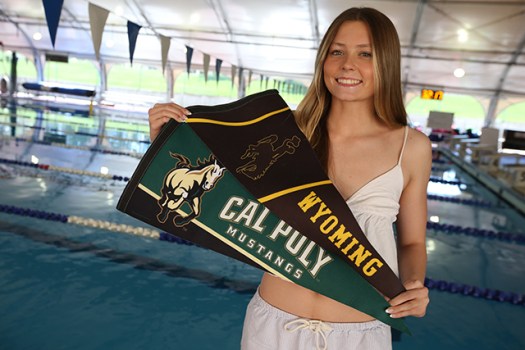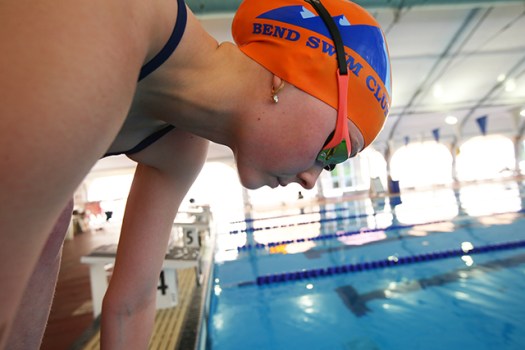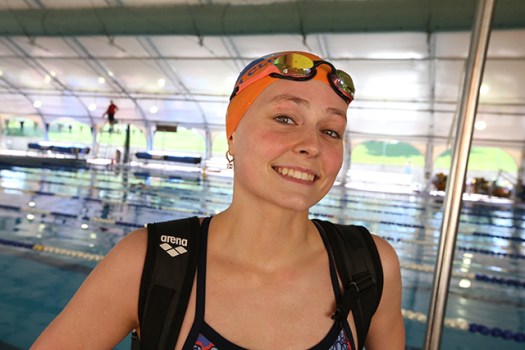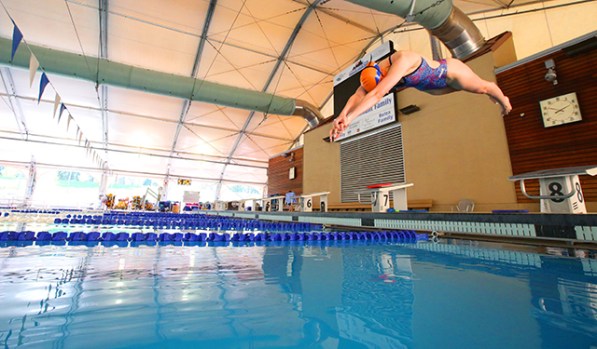Bend High’s Hadley Hayes overcomes significant challenges to earn a college swimming scholarship
Published 8:00 am Saturday, May 10, 2025
While Hadley Hayes was growing up, she and her mother Kelli Hayes had a nightly ritual to recap their days. The premise was simple, as the two would share the best part of their day and the worst part of their day — the highs and lows.
The final step of the routine was to be grateful not only for the “high,” but also be grateful for and determine what benefit could come from the “low.”
“She became really good at that,” Kelli Hayes said. “She’s grown up taking the hard things and turning them around and immediately saying, ‘What good came from this, or what good will come from this.’”
Some days, especially when she was younger, the highs and lows were trivial — like a high of eating an ice-cream bar and a low of being tripped by someone at school — but the daily routine was far from it. It helped build a resilient kid who could handle extreme challenges, including a father who was in and out of prison and engulfed by the opioid epidemic, and having her dream college’s swimming program discontinued out of the blue.
In just a few weeks, Hadley Hayes will graduate from Bend High, where she was a member of the dominant Lava Bears girls swim team. She was a two-time state champion in the 100-yard breaststroke, posting some of the fastest times in state history in the event, and was part of multiple record-setting relay teams over the past two seasons.
Hayes will soon leave Bend for the University of Wyoming on a full-ride swimming scholarship. Laramie is a place she believes she can thrive, putting an end to a turbulent recruiting process.
“It was relieving to feel like, ‘OK, I know where I’m going,’” Hadley Hayes said. “It’s not like, ‘What are we doing?’ I don’t feel like I’m lost anymore.”
The nightly ritual of going over the highs and lows of the day started not long after Hadley’s father, Justin Hayes, left her life, around the time she was 4.
A work injury in the summer of 2006, shortly before Hadley was born, left Justin with his foot in a cast and unable to work. On one hand, it was great. He was able to stay home with his infant child and form a bond.
“I was definitely daddy’s girl through and through,” Hadley said. “He knew exactly what I wanted. He knew how to play. It was like we were best friends.”
But on the other hand, life began to decline for Justin.
The initial injury to his foot did not improve. A couple of weeks after Hadley was born he underwent surgery and was prescribed opioids to deal with pain, according to Kelli Hayes. He remained on the pill for more than a year. He became addicted and was on the drug until he was flagged at a doctor’s office because he was aggressively seeking more pills.
“He was part of that first wave, the worst wave, because there was no regulation on opioids yet,” Kelli Hayes said. “And so normally now there’s checks and balances in place. You can only be on it so much. They only give you so much. They prevent you from what’s happening with Justin.”
Things began to unravel for Justin. He tried going to rehab. He tried methadone and suboxone, medicines that treat opioid addiction. But neither seemed to work. He was fired from his job while in rehab and he turned to the streets to find the drugs, according to Kelli. He did not show up for Hadley’s fifth birthday party. And when he returned to their home later that week he said, “You guys need to forget about me,” Kelli recalled. He left and did not return.
Not long after, Justin Hayes was arrested and convicted of commercial theft. He spent five years in prison, including some time in the Deer Ridge Correctional Institution in Madras. After his release in January 2017, he struggled to find and hold down jobs, according to Kelli.
“He lasted about six months, and then he went back to drugs on the street, and that was it,” Kelli Hayes said.
As Hadley got older, visits from her father became less and less frequent. The last time Justin and Hadley spoke was at the state swim meet in Beaverton in February. It was the first time in more than a year they had seen one another.
The meeting was a brief one. A quick exchange and a quick photo and they went their separate ways.
“He didn’t really want to be seen, like he didn’t want me to see him, that he was there, but he wanted to be there,” Hadley said.
Justin Hayes could not be reached for comment on this story.
Around the same time that her father went to prison, Hadley began to take to swimming.
Justin Hayes was also a talented swimmer in his youth, according to Kelli.
When she was 5, Hadley began taking swimming lessons. Then she joined the Bend Swim Club.
“It was just like, ‘Wow, this is a really good rhythm for her,” Kelli Hayes said. “And I thought, wow, this is a really good rhythm. And so Hadley got in there, and she did pretty well.”
Hadley did so well, in fact, that collegiate swimming was in her future.
The first week of March this year, everything seemed right for Hadley. Just a few weeks prior, she had cemented herself as one of the state’s top breaststrokers in history, capping off a high school career of team titles and state records for the Lava Bears.
She had shut down her college recruitment and told other schools that had expressed interest to not save a spot for her. She had found the perfect school in California Polytechnic State University.
In picturesque San Luis Obispo, just a short drive from the beaches of California’s central coast, Cal Poly seemed to check every box for Hayes. It had the major she wanted to pursue, material engineering. She would have a familiar teammate in Melia Costa, who was part of the Bend Swim Club and Bend High swim team. And while she was on her recruiting trip, members of the swim team had invited Hayes to attend a Bible study.
“Everything about Cal Poly was like a dream school,” Hayes said. “It had the academics, it had the major that I wanted, you know, the weather. Everything about it was just like, that’s it.”
But Hayes had a rude awakening on the morning of March 7. There was an urgent text message from Costa — Cal Poly had discontinued its men’s and women’s swimming and diving programs.
“I shot out of bed,” Hayes said. “It’s March. I’m supposed to be moving to college in less than six months. To restart the recruiting process, look for colleges, I would consider that very scary. Most of the colleges, their rosters were full.”
Later that day, Cal Poly president Jeffrey Armstrong released a statement saying the programs would end effective immediately and that the “financial realities made the decision unavoidable.”
“Unfortunately, Cal Poly is not immune to the rapidly evolving and changing NCAA Division I landscape, which presents many challenges and uncertainties for collegiate athletics programs,” Armstrong wrote. “The House vs. NCAA settlement, which addresses past and future compensation for student athletes related to name, image and likeness (NIL) rights, will have a significant financial impact …This comes amid additional national class-action lawsuits pending against the NCAA, further compounding financial and operational challenges for collegiate athletics.”
There had been rumors of the potential cancellation of the swim program, and Hayes asked about it on her recruiting visit in January. She was told it wasn’t going to happen.
“It was like a rumor. And, you know, you talk to your coaches, you talk to the team, and they’re all like, ‘No, it’s not going to happen,’” Hayes said. “And for the recruits, it was a hard thing because the application deadline had passed, like, you know, applying to other colleges. And the other thing was then also the fact that we had given away other roster spots.
“It was really careless,” Hayes continued. “They were very careless, and really did hurt the athletes all around.”
College athletics have taken a drastic turn in recent years, primarily related to athlete compensation. Football and men’s basketball are generally the only sports in athletic departments that generate revenue. Those programs often subsidize the Olympic sports (track and field, wrestling, swimming, etc.).
With the pending NCAA settlement dealing with Name, Image and Likeness (NIL) rights for athletes, schools are faced with limiting rosters, cutting walk-ons and athletes on partial scholarship, and in extreme cases like at Cal Poly, cutting entire programs.
The University of Wyoming was nowhere on Hayes radar prior to the Cal Poly fallout. She had only reached out to schools in California, only responded to schools in California. That is where she wanted to be.
When she returned home from her recruiting trip to Wyoming in early April, she began crying in the Redmond Airport.
“Laramie is a cute country town,” Hayes said. “The university is so full of history, the facilities were so nice and the people were so nice. Everything about it was great. But I was like, this isn’t what I wanted.”
It was another low from which she knew she could find a silver lining.
Suddenly, the highs of Wyoming began to take shape. It was a near full-ride swimming scholarship as opposed to a partial scholarship to Cal Poly. Wyoming’s coach, Dave Denniston, was an elite breaststroker and twice competed in the U.S. Olympic Trials and had coached a breaststroker to the Olympic Trials.
Perhaps more importantly, there was a sense of comfort knowing that what happened to Cal Poly’s swim program wasn’t going to happen at Wyoming.
“I remember saying to my mom if everything about the University of Wyoming was in San Luis Obispo, I would pick Wyoming,” Hayes said. “And she was like, ‘Maybe you need to pick Wyoming.’”
At first, Wyoming did not seem like the place Hadley wanted to go to college. It wasn’t what she was looking for. It was low on the list. But lows don’t tend to last long with Hadley.
“She’s a miracle kid, and she deserves everything she’s worked for,” Kelli Hayes said. “And I just can’t wait to watch her climb to new heights.”














